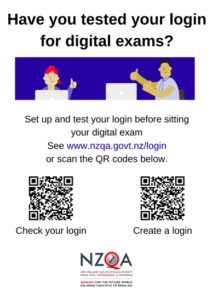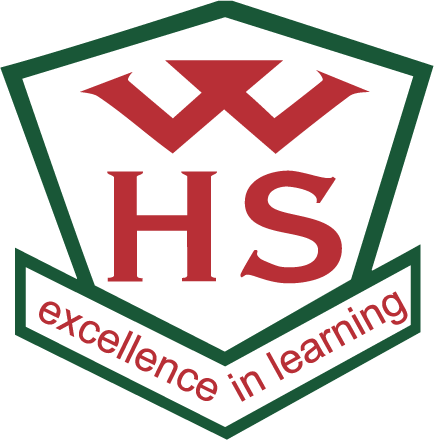The National Certificate of Educational Achievement (NCEA) is the main national qualification for secondary school students in New Zealand. NCEAs are recognised by employers, and used for selection by universities and polytechnics, both in New Zealand and overseas.
NCEA Exam Information
- NCEA Exam Timetable [Website]
- NCEA Exam Timetable 2024 [PDF]
- WHS Exam Information 2023 – Assembly Powerpoint
NCEA General Information
- How NCEA works
- Using NCEA when you leave school
- NCEA Subject Resources
- NCEA Requirements
- NCEA Endorsement
- Assessment Procedures – 2024

Digital Exams
Make sure you have practised logging in before you sit a digital exam.
- This poster shows you how: Test your login [PDF]
- or go to https://www.nzqa.govt.nz/login/
Frequently Asked Questions
Where can I find a calendar of assessments?
- On this website, go to Students > Calendars > NCEA Level 1/2 or 3
- Students are invited to NCEA assessment events through their school Google calendar. When they choose to accept the invitation, the assessment event will stay in their Google calendar. This means that their Google calendar should contain all the assessment information related to them for all internal assessments throughout the year.
- Additionally, course information is published on the WHS student hub at Course Information.
What do I do if I need an extension for an assessment?
If you missed / will miss an assessment due to illness, family trauma or a school sporting/cultural activity you will need to apply for an extension. Please follow the NCEA Internal Assessment Guidelines (see above) for the correct forms and a further clarification of your rights and responsibilities.
What do I do if I want to appeal my grade?
If you wish to appeal a grade that you have received, fill out the form below and hand in to your Teacher/HOF within 48 hours of receiving your assessment back. Please follow the NCEA Internal Assessment Guidelines (see above) for the correct forms and a further clarification of your rights and responsibilities.
This document gives the boundary marks for each of the external standard papers. It can be used to help you determine how close you were to the next grade.
NCEA Exams – Derived Grade Applications
If you can not sit an exam and would like to apply for a derived grade, you will find information about eligibility, the application process and the application form on this NZQA website. The completed application form needs to be forwarded to Rebecca Rāpira-Davies at rsr@whs.school.nz no later than 14 days after the last affected assessment date.
If you have cold, flu or COVID-19 symptoms, you should follow Ministry of Health guidelines. If you choose to isolate yourself for five days because you have COVID-19 and are unable to sit your examination(s) you can apply for a derived grade. In this case, the school will complete the form on your behalf as long as you provide evidence. Evidence should include a date stamped photo of yourself with your positive RAT result, and the text from the Ministry of Health acknowledging your COVID-19 result.
Please contact Rebecca if you have any questions or need help with this process.
University Entrance
University Entrance (UE) is the minimum requirement to go to a New Zealand university.
- NCEA Level 3
- Three subjects – at Level 3, made up of:
- 14 credits each, in three approved subjects
- Literacy – 10 credits from the new corequisite standards 32403 and 32405 [5 credits each]. If you have already got literacy before the end of 2023 that is sufficient.
- Numeracy – 10 credits from the new corequisite standard 32406. If you have already got numeracy before the end of 2023, that is sufficient.
Once you have met the requirements for University Entrance it will appear on your Record of Achievement.
More Information about University Entrance can be found here
Information On Guaranteed Entry Scores
University Entrance will entitle you to entry to university but it may not immediately get you into the course you wish to study. In addition to the university entrance requirement, some universities work on a GES (Guaranteed Entry Score) for different degrees. For example, at Victoria University the GES from NCEA is 150 points for all degrees except the Bachelor of Architectural Studies and Bachelor of Building Science which requires a Guaranteed Entry Score of 180 points.
The GES is based on the 80 best credits in university-approved subjects and is calculated by awarding points as follows:
- Excellence = 4 points
- Merit = 3 points
- Achieved = 2 points
If you achieve university entrance but not the required GES, the university will most likely waitlist you.
A quick calculation – If you ‘achieve’ 60 credits at level 3, you will get a GES of 120 – not enough. If you ‘achieve’ 30 credits at level 3 and get 30 ‘merit’ credits, you will get a GES of 150 – just enough.
For more information click on the university links below.
- Victoria University
- University of Auckland
- University of Canterbury
- Lincoln University
- University of Otago
- Massey University
- University of Waikato
- Auckland University of Technology
Scholarship Information
Scholarships provide significant recognition and financial support to students who are striving for academic success in the tertiary environment. Click the link below to find out the range of scholarships available.
Generosity is a government funded site that offers access to more than 4,000 scholarships and grants for individuals. Click here to learn more
